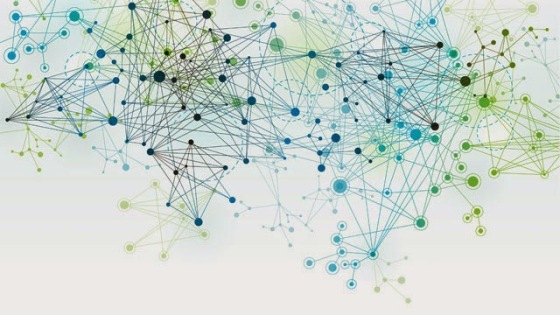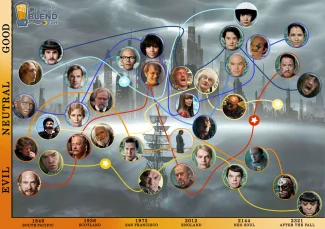Our lives are not our own. From womb to tomb, we are bound to others. Past and present. And by each crime and every kindness, we birth our future.”
Last weekend, a few of the student friars watched what I found to be one of the most interesting and thought-provoking movies I had ever seen: Cloud Atlas. Besides being an ascetically imaginative movie with incredible scenery, special effects, and makeup, the directing of the story was truly fascinating. Unlike most movies that have a protagonist, a conflict, and a resolution, and present events in the order in which they happened, this movie interlaces six different stories, each based in different places and spanning multiple centuries, and progresses thematically, not linearly. Added to the peculiarity of the plot was that the small cast of 13 actors played a total of 65 characters, some even playing a different character in each time period, often transitioning age, race, and gender. One minute Tom Hanks is a greedy doctor stealing from his patients on a Pacific trading ship in the 19th century, the next he’s a physicist working at a San Francisco power plant, the next he’s a shepherd in a primitive society years after an alleged fallout in society; he is at one moment the protagonist, the next an extra in another character’s story.
Like any great piece of art, the medium is the message in Cloud Atlas, and the message is as complicated, and profound, as its medium: humans are inescapably linked to one another, in person and across human history, and the decisions made before us have a profound effect on our ability to act. What the movie displays so powerfully is that no one is an island and no one’s actions affect only them. Everything we do affects people around us. Even the most subtle gestures or the most minor of insults can have lasting impacts on who we are and what we choose to do. And it doesn’t stop with us. Having affected someone with our decisions, this other person will inevitably do the same, passing on what they have felt from us to another person. Everything we do to another, whether it be love or hate, heroism or cowardice, charity or greed, inclusivity or racism, can and will be passed on to the next. What one does in one time period, for better or for worse, can be passed on to other times, crossing many generations, geographies and even cultures. In the movie, generations of people continued to make the same mistake, acting towards another as someone had acted to them, inadvertently passing on the decisions of those that had come before them.
While not intending to make a Christian statement, what Cloud Atlas does is present the clearest example of the power of sin to limit our freedom I have ever seen. This was a major topic of discussion with my spiritual director during novitiate. For him, Family of Origin was the answer to almost everything. For any issue I brought up in myself, he worked with me trace it to its origin, the place where I learned to think or act in a certain way. Did I get it from one of my parents, a close friend? And where did they get it from? Their parents? How far back does it go? For him, and other Family of Origin proponents, our values, desires, goals, fears, strengths and weaknesses do not pop out of thin air and they are not systematically chosen by us. No one has the freedom to choose their personality or their fears, but they do have an origin, and left unattended, they will be passed on to others.
All of this may sound rather simple to some, and if you’ve gotten this far, you might be wondering why I’ve used up 635 words to say that we’re influenced by our parents. As a religious blog, does this have anything to do with Christianity? Yes. The point I’m working to make, the most thought-provoking part of this movie and my time with my spiritual director can be summed up in one line he said during one of our sessions: “So now that you’ve discovered a defect in yourself that is likely to have been passed down to you through many generations, wouldn’t it be something if this defect stopped with you, if you could resolve it in yourself so as to not pass it on to anyone else? Do you think you could bring redemption to your whole family?” Wow. What a thought. Like the characters in the movie, I realized that I was intimately connected with those who had come before me; like the heroic characters in the movie, I realized that I had the ability to bring resolution to potentially hundreds of years of a particular character defect or action by not passing it on myself. In the movie, one racism is passed down for hundreds of years unquestioned until one character chooses to act differently. Done. It will not be passed on to the next generation in that family. What if I could do the same with the fears, insecurities, and inordinate desires I had acquired form others, family or not?
This is where Christ comes into the picture and I depart from the movie. While the movie presents reincarnation as the ultimate principle guiding human souls and potentially offering resolution to sinfulness, we as Christians know that Jesus Christ is the only one capable of breaking our cycle of sin in an absolute sense. Whereas we will inevitably pass down some form of alienation due to sin, alienation from God and from ourselves, Jesus was and in the resolution to all sin. Faced with everything that we face, experiencing all that humanity experiences, Jesus acted in perfect obedience and returned nothing but love for all the hate he received. He did not perpetuate the sins of our fathers (and mothers); he transformed them into love. Rather than acting as the world does, returning violence for violence, he freely accepted his death, allowing God to transform death into life with the resurrection. In him, and through his grace, we are given not only the example of how to live, to transform the errs of those before us into love, we are given the strength and ability to do so perfectly. When we act as Christ did and bring resolution to a complex world of sin, it is in fact Christ working in us, bringing resolution and redemption to hundreds of years of alienation and defect, transforming opportunities for sin into opportunities for love and grace. While Cloud Atlas does not take the message of redemption to this extent, it does an incredible job of showing the effect our actions can have not only on ourselves, but all of history.
***
If you’re thinking about running out right now and getting this movie for the next family night, I do offer a strong disclaimer. This movie is rated R for a reason, and I would not recommend it for all audiences. The overall message is a powerful one, but often the way that message is depicted is through less than admirable actions.

